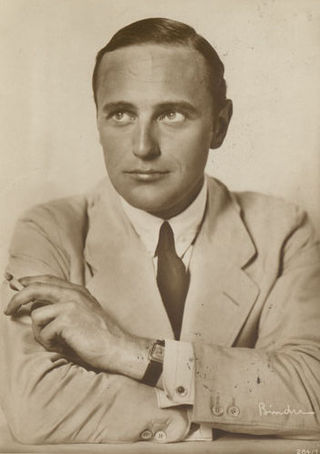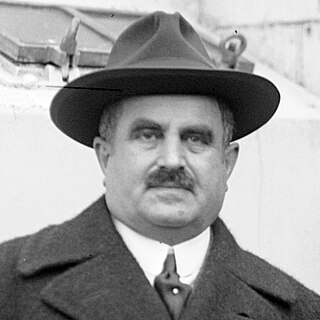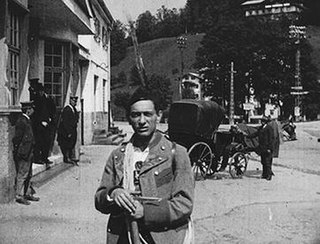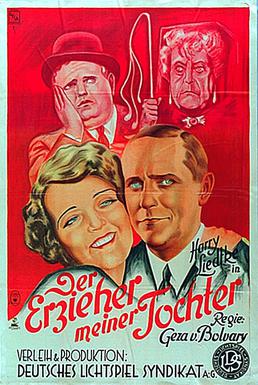Related Research Articles

The Oyster Princess is a 1919 German silent comedy film directed by Ernst Lubitsch and starring Victor Janson, Ossi Oswalda and Harry Liedtke. It is a grotesque comedy in four acts about an American millionaire's spoiled daughter's marriage that does not go as planned. It was shot at the Tempelhof Studios in Berlin. The film's sets were designed by the art director Kurt Richter, a frequent collaborator of Lubitsch.

Ossi Oswalda was a German actress, who mostly appeared in silent films, many of which were early films of German filmmaker Ernst Lubitsch. Her characters were often eccentric, spoiled, and child-like. Oswalda was given the nickname 'The German Mary Pickford' due to her popularity at the time.
I Don't Want to Be a Man is a 1918 German film directed by Ernst Lubitsch.

Harry Liedtke was a German film actor.

The Doll is a 1919 German romantic fantasy comedy film directed by Ernst Lubitsch. The film is based on the operetta La poupée by Edmond Audran (1896) and a line of influence back through the Léo Delibes ballet Coppélia (1870) and ultimately to E. T. A. Hoffmann's short story "Der Sandmann" (1816).

Paul Davidson was a German film producer.

Meyer from Berlin is a 1919 German silent comedy film directed by Ernst Lubitsch and starring Lubitsch, Ossi Oswalda and Ethel Orff. It was part of the Sally series of films featuring Lubitsch as a sharp young Berliner of Jewish heritage. It was Lubitsch's penultimate film as an actor, after 1920 he devoted himself entirely to screenwriting and directing.

Shoe Palace Pinkus is a 1916 German silent comedy film directed by Ernst Lubitsch and starring Lubitsch, Else Kentner and Guido Herzfeld. In English it is sometimes known by the alternative titles Shoe Salon Pinkus and The Shoe Palace. It was part of the Sally series of films featuring Lubitsch as a sharp young Berliner of Jewish heritage. After leaving school, a self-confident young man goes to work in a shoe shop. Soon after, he becomes a shoe tycoon.

Carmen is a 1918 German silent drama film directed by Ernst Lubitsch and starring Pola Negri, Harry Liedtke, and Leopold von Ledebur. It was based on the novella Carmen by Prosper Mérimée. Like Bizet's opera Carmen, this film only adapts the third part of Mérimée's novella and transforms the character of Don José at the beginning of the story from bandit on the run to honest man in love with his childhood sweetheart. The film was released with English intertitles in the United States in 1921 under the alternative title Gypsy Blood.

My Wife, the Movie Star is a 1919 German silent comedy film directed by Ernst Lubitsch and starring Ossi Oswalda, Paul Biensfeldt and Victor Janson.

When Four Do the Same is a 1917 German silent comedy drama film directed by Ernst Lubitsch and starring Ossi Oswalda, Emil Jannings and Margarete Kupfer. Lubitsch himself plays a book shop employee who falls in love with Jannings' daughter. The film was a key transitional work in Lubitsch's career, as he began to produce films with greater depth than his early light comedies.

Erich Schönfelder (1885–1933) was a German screenwriter, actor, and film director of the silent and early sound eras. Early in his career he worked frequently with Ernst Lubitsch.

My Daughter's Tutor is a 1929 German silent comedy film directed by Géza von Bolváry and starring Harry Liedtke, Dolly Davis, and Charles Puffy. The plot closely mirrored that of Ernst Lubitsch's The Oyster Princess. It was shot at the Tempelhof Studios in Berlin. The film's art director was Robert Neppach.

A Crazy Night is a 1927 German silent comedy film directed by Richard Oswald and starring Ossi Oswalda, Harry Liedtke and Henry Bender. It was shot at the EFA Studios in Berlin. The film's sets were designed by the art director Heinrich Richter.

Josef the Chaste is a 1930 German comedy film directed by Georg Jacoby and starring Harry Liedtke, Iwa Wanja, and Elga Brink.
The Girl on a Swing is a 1926 German silent film directed by Felix Basch and starring Ossi Oswalda, Harry Liedtke, and Lotte Lorring.
The Dancer Barberina is a 1920 German silent historical drama film directed by Carl Boese and starring Lyda Salmonova, Otto Gebühr, and Harry Liedtke. Part of the group of Prussian films of the Weimar and Nazi eras, it portrays the relationship between Frederick the Great and the dancer Barberina Campanini in eighteenth century Prussia. Gebühr starred as Frederick in another film on the subject, The Dancer of Sanssouci (1932).
The Swabian Maiden is a 1919 German silent comedy film directed by Georg Jacoby and Ernst Lubitsch and starring Ossi Oswalda, Carl Auen and Hermann Böttcher.

The Ballet Girl is a 1918 German silent comedy film directed by Ernst Lubitsch and starring Ossi Oswalda, Harry Liedtke and Margarete Kupfer.
The Housing Shortage is a 1920 German silent short comedy film directed by Ernst Lubitsch and starring Victor Janson and Marga Köhler and Ossi Oswalda. It is now considered a lost film.
References
- ↑ Thomson p.145